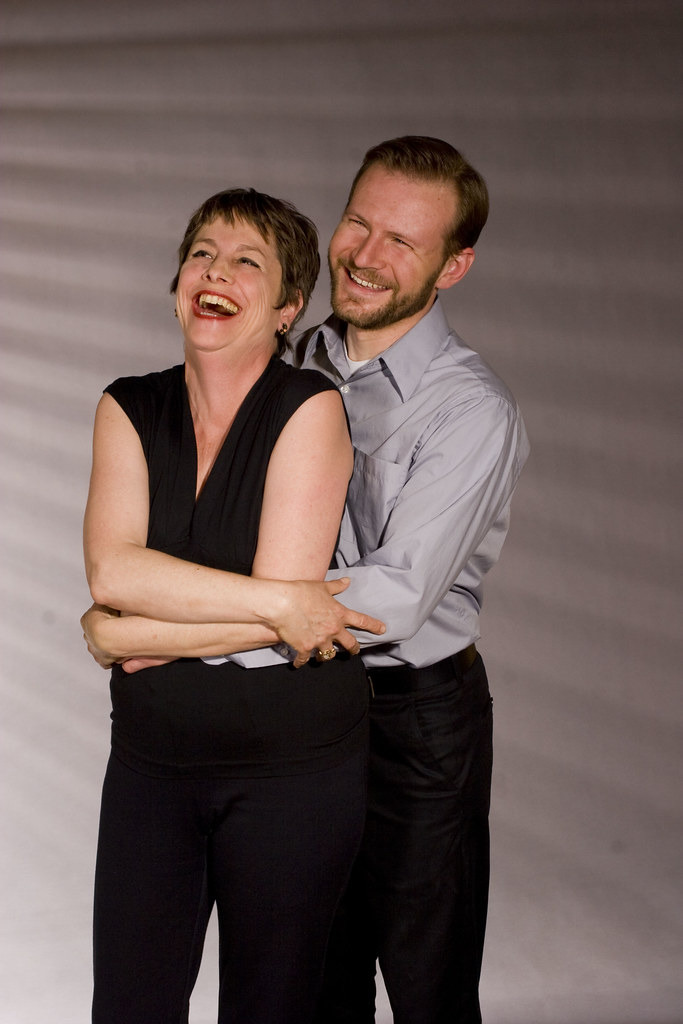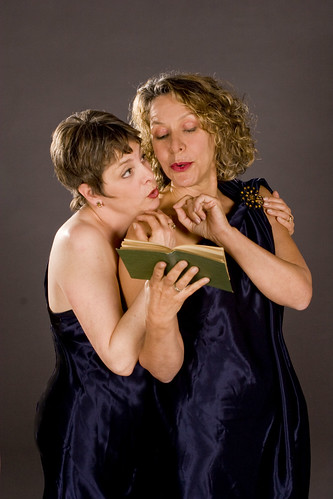EXTENDED THROUGH JUNE 21!
JoAnne Winter is Cora and Ryan Tasker is Billy in Two on a Party, a theatrical adaptation of a Tennessee Williams short story and a co-production of Word for Word and Theatre Rhinoceros. The story is one of a trilogy, alongside work by Gertrude Stein and Armistead Maupin, and part of an evening dubbed Three on a Party. Photos by Kent Taylor
Something to celebrate: `Party’ trio brings out best in Word for Word, Rhino
««««
You know something’s working when even Gertrude Stein is the life of the party.
It’s no exaggeration at this point to say that Word for Word is magical. For 16 years now, this company has been creating some of the best theater in the Bay Area out of short works of fiction. Though they change not a word of the original text, their stage works are fully theatrical and quite often more exciting, more moving and more expertly performed than work created expressly for the theater.
The Word for Word alchemy – take a story, add a stage, throw in a dash of brilliance – receives a jolt of inspiration with a new collaborator in the form of Theatre Rhinoceros, the nation’s oldest, continuously operating gay and lesbian theater. The two companies join forces for Three on a Party, an evening of three short stories by gay authors spanning the 20th century, from Stein’s Miss Furr and Miss Skeene (written in 1910, published in Vanity Fair in 1922) to Tennessee Williams’ Two On a Party (written in 1951, published in 1954) to Armistead Maupin’s Suddenly Home (written in 1990).
I tried to read the Stein story and, to be perfectly honest, couldn’t get through it, which is why I’m all the more impressed with director Delia MacDougall for not only making the story a vibrant piece of theater but also for giving it fully rounded characters and emotional depth. Apparently Stein was trying to do in words what Picasso, in his cubist phase, was doing on canvas. Her Miss Furr and Miss Skeene is almost Dr. Seuss-like in its constant use of the words “gay” and “regular.”
Here’s a taste: “Certainly Helen Furr would not find it gay to stay, she did not find it gay, she said she would not stay, she said she did not find it gay, she said she would not stay where she did not find it gay, she said she found it gay where she did stay and she did stay there where very many were cultivating something. She did say there. She always did find it gay there.”
But MacDougall, along with JoAnne Winter as Miss Furr and Sheila Balter as Miss Skeene and Brendan Godfrey and Ryan Tasker as the people in their lives, find the music and the humor in Stein. What had a tendency to become annoying on the page finds new life and clarity on the stage.
The centerpiece of the evening is the hour-long Williams story about two sozzled soul mates, Cora (Winter) and Billy (Tasker). She’s a barfly with a voracious sexual appetite, and he’s a gay writer more interested in liaisons than letters. They meet in a Broadway bar (where Balter is at the piano playing “In the Wee Small Hours of the Morning”), and over a double rye on the rocks, recognize something in one another that leads them to join forces – on the man hunt and as partners, of a sort, in life. They begin living and traveling together in pursuit, as Billy says, “of the lyric quarry.” They even make a misguided attempt at sex, which Cora sweetly brushes aside: “Sex has to be slightly selfish to have any real excitement.”
Williams’ writing is thrilling as what seems to be a fairly shallow tale of vice, brutality and hooch deepens into a love story about loneliness, companionship and sexual attraction. Director John Fisher finds endlessly clever ways to keep the story moving and evolving and makes expert use of a giant rectangle that is, by turns, a bar, a hotel desk, a train compartment, an elevator and a Buick Roadmaster.
Winter and Tasker are extraordinary as they imbue the lush life of their characters with wells of emotion. Cora, whose eyes are described as “a couple of poached eggs in a sea of blood,” is above all else a kind person, and Winter makes that abundantly clear. Cora is complex and darkly shadowed but easy to love. Tasker’s Billy is somewhat aloof, which is not to say he lacks vitality. There’s nothing simple about him, but he’s a visitor to this rambling, shambling life and will eventually return to his world of words and leave life “on the party” behind.
The final piece of the trilogy belongs to San Francisco’s own Maupin, who sets his tale in an idyllic Noe Valley, where Will (Godfrey) and his husband, Jamie (Tasker), are making a happy life for themselves in the shadow of the AIDS plague. They’re visited by Will’s sister, Tess (Balter), who is on her way to Maui and a marriage with a man who treats her less than well.
Also directed by Fisher, and set to the bouncy-but-needy strains of Whitney Houston’s “I Wanna Dance with Somebody (Who Loves Me),” Suddenly Home has the familiar rhythms of a sitcom but with some welcome sass and cynicism. Jamie, an AIDS activist, has just returned from a demonstration at Nordstrom and the spiral escalator. He describes it as being “like Tiananmen Square meets Busby Berkeley.”
This is Balter and Godfrey’s chance to shine, and their warmth and familial friction gives the piece a beating heart and some realistic edge.
I’ve said it before, and I plan on saying it again and again: there’s nothing better than a good Word for Word show, and this collaboration with Theatre Rhino is good times three and then some.
FOR MORE INFORMATION
Word for Word and Theatre Rhinoceros’ Three on a Party continues an extended run through June 21 at Theatre Rhino, 2926 16th St., San Francisco. Tickets are $30-$50. Call 415-861-5079 or visit www.therhino.org or www.zspace.org.




You are so right Chad about trying to read Gertude Stein’s “Miss Fur and Miss Sheen”. It is a difficult read. As you probably know it is based on fact. Two midwestern women Ethel Mars and Hunt Squires came to Paris in 1911 to take up painting and to pursue a lesbian relationship. They even broke up in Paris after the relationship. I love the way the actors keep repeating over and over and over again “regulary Gay” It is also interesting to note that when the story was reprinted in Vanity Fair magazine in 1923 this was the first time that the word “gay” became an underground meaning as a homosexual life style.
I should have continued. I love the way Ryan Tasker played Billy. This was Tennessee Williams. I met him several times in Los Angeles and once in New York. Tennesse loved rough trade. I knew of a bar downtown Los Angeles where he would go sometimes. I was always surprised that he was not killed by some of the trade he picked up. NO I did not go to the bar.
I’ve been hearing good things about this show. You’re luscious review sealed the deal. Thanks for the hot tip Chad.